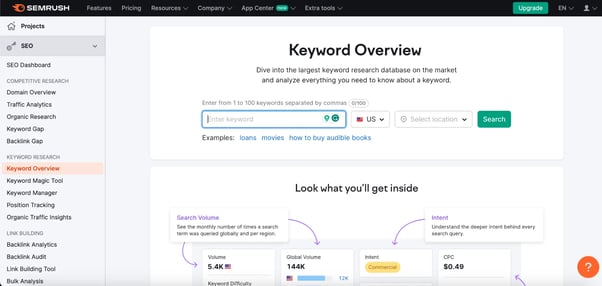In this article, we explore B2B SEO best practices and how you can tailor your approach for maximum impact.
Compared to B2C businesses, B2B companies face unique challenges in their SEO efforts. So understanding the nuances of B2B SEO can be the key to unlocking your company’s potential.
The good news? With the right strategies, you can significantly enhance your online presence, attract more organic traffic, and connect with your potential customers.
The difference between B2B SEO and B2C SEO
When we talk about SEO, it's essential to recognise that the playbook for B2B companies isn't the same as for B2C companies. The primary distinction lies in the target audience and their journey towards making a purchasing decision.
In B2C, the path to purchase is typically shorter, with decisions often driven by emotion and impulse. Here, SEO focuses on capturing the user's attention quickly with keywords that have high search volumes and targeting content that appeals to a wider audience.
On the other hand, B2B SEO caters to a more informed and professional audience. Decision-makers in businesses tend to take a more analytical approach. They spend more time researching, comparing, and contemplating before making a decision.
This process involves multiple stakeholders, each contributing to a longer sales cycle. As a result, B2B SEO requires a deep understanding of your target keywords, search intent, and the specific needs of your potential buyers.
Another key aspect is the content strategy.
B2C companies can often rely on more general, broad-reaching content. In contrast, B2B content needs to be more detailed, industry-specific, and often technical.
It's not just about attracting traffic; it's about attracting the right kind of traffic – the decision-makers and influencers in your target market.
How to develop a B2B SEO strategy in 7 steps
Developing a successful B2B SEO strategy requires careful planning and execution. Here's a step-by-step approach to guide you:
1. Create detailed buyer personas
The foundation of any effective B2B SEO strategy is a deep understanding of who your potential customers are. This is where buyer personas come in.
By creating detailed profiles of your ideal B2B buyers, you can tailor your content and SEO efforts to address their specific needs and pain points. Consider factors like industry, job role, challenges, and goals.
This approach ensures your content resonates with the right people, making your SEO efforts more targeted and effective.
2. Understand your business' sales funnel
The B2B sales funnel is more complex than its B2C counterpart. It often involves a series of stages from awareness, and consideration, to decision. Each stage requires a different SEO approach.
For example, at the top of the funnel, your potential customers are just beginning to realise they have a problem that needs solving. Here, your content should focus on broader topics and general industry keywords to attract and educate your audience.
As they move down the funnel, your content should become more specific, addressing detailed queries and solutions.
3. Conduct keyword research around your buyer personas
Armed with your buyer personas, the next step is to conduct thorough keyword research. This isn't just about finding high-volume search terms; it's about finding the right terms that your potential customers are using.

Image Source: SEMRush
Use keyword research tools like SEMRush to discover relevant keywords and phrases.
Look for a mix of high and low-volume keywords, including long-tail keywords, which are often less competitive and more specific to your target audience's search intent.
4. Choose keywords to target buyers at different stages of the funnel
Now that you have a list of relevant keywords, it's time to map them to different stages of your sales funnel. This tactic ensures that you create content that appeals to potential customers, no matter where they are in their buyer journey.
For instance, broad, informational keywords are perfect for top-of-funnel content like blog posts or white papers, while more specific, product-related keywords are suitable for bottom-of-funnel content like case studies or product pages.
This strategic mapping improves your content's relevance and enhances the user experience, guiding potential buyers smoothly through the funnel.
5. Optimise your product or service landing pages
Your product or service landing pages are where the magic happens – they're where potential buyers turn into leads. These pages must be optimised for both search engines and user experience.
Follow landing page best practices by ensuring your primary keyword is present in the title, header tags, and throughout the content in a natural, reader-friendly manner. Don't forget to optimise your meta descriptions, as they can significantly influence click-through rates from search engine results.
Additionally, ensure these pages load quickly, are mobile-friendly, and provide clear CTAs to maximise conversion rates.
6. Create a content strategy that can scale
A scalable SEO content strategy is essential for maintaining a consistent and impactful online presence. This includes a mix of blog content, long-form articles, infographics, and videos.
Each piece of content should be aligned with your target keywords and buyer personas. Also, consider developing a content calendar to organise and schedule your content efficiently.
Remember, the goal is to provide valuable, high-quality content that addresses your audience's needs and positions your company as a thought leader in your industry.
7. Promote your content to earn backlinks
Creating great content is only half the battle; the other half is promoting it to earn backlinks. Backlinks are crucial for improving your search engine rankings and enhancing your site's authority.
Techniques like guest posting on reputable sites in your industry, engaging in digital marketing efforts, and leveraging social media can significantly increase your content's reach.
Additionally, building helpful tools or resources can attract backlinks naturally, boosting your SEO efforts.
B2B SEO best practices you should be following
Now that we've covered the strategic aspect, let's dive into some essential B2B SEO best practices that can help fine-tune your efforts:
- Check for 404s: Regularly monitor your website for broken links or 404 errors. These not only create a poor user experience but can also negatively impact your search engine rankings.
- Audit your sitemap and Robots.txt: Ensure your sitemap is up-to-date and accurately reflects your site's current structure. Similarly, check your robots.txt file to make sure it's not inadvertently blocking important pages from being crawled.
- Set up analytics and conversion tracking: Tools like Google Analytics and Google Search Console are invaluable for tracking your site's performance, understanding your audience, and measuring your SEO success.
- Check for HTTPS: Security is a priority for Google, and sites with HTTPS are favoured in search rankings. Ensure your site is secured with an SSL certificate.
- Audit Canonical & HREFLANG tags: These elements help prevent duplicate content issues and are particularly important for sites targeting multiple regions or languages.
- Do competitor analysis & keyword research: Keep an eye on your competitors' strategies and continuously refine your keyword research to stay ahead in the game.
- Implement internal linking: Effective internal linking helps distribute page authority throughout your site and improves navigation for users. It also cross-promotes related content to increase the likelihood of visitors engaging with your site and moving further down their buyer’s journey.
- Check your content's metadata: Ensure that each piece of content on your site has compelling and keyword-rich meta titles and descriptions. This not only helps search engine rankings but also improves click-through rates from search results.
- Review your site speed: A fast-loading website is crucial for a good user experience and is also a ranking factor for search engines. Use tools like Google's PageSpeed Insights to analyse and improve your site's loading times.
- Check your Core Web Vitals report: Google's Core Web Vitals are a set of metrics related to speed, responsiveness, and visual stability. Ensure your site meets these criteria to enhance user experience and support SEO.
- Audit for mobile friendliness: With the increasing use of mobile devices, having a mobile-friendly website is essential. Use Chrome Lighthouse to ensure your site is optimised for mobile users and that it follows other mobile SEO best practices.
- Seek backlinks: Actively seek high-quality backlinks from reputable sites. This not only boosts your SEO but also drives traffic and enhances your site's credibility.
- Do a toxic backlink audit: Regularly audit your backlink profile to identify and disavow toxic backlinks that could harm your SEO performance.
- Implement guest posting: Contribute high-quality guest posts to relevant industry blogs and websites. This not only helps in link-building but also positions you as a thought leader in your field.
- Build helpful tools for your industry: Creating useful tools or resources can naturally attract backlinks and drive traffic to your site, significantly enhancing your SEO efforts.
For more ideas on how to optimise your strategy, check out these SEO case studies.
Best practices to overcome the main challenges of B2B SEO
B2B SEO comes with its own set of challenges. Here’s how you can tackle them effectively:
Challenge #1: Competition in diverse industries
One of the unique challenges in B2B SEO is the broad spectrum of competition you might face. This competition comes not only from known competitors within your industry but also from a variety of companies that Google may display in search results for the same keywords you're targeting.
This situation is particularly complex when dealing with keywords that have multiple meanings, including initialisms and acronyms, leading to a mix of results spanning various industries.
For B2B companies, particularly those reselling products, this complexity is compounded. You often find yourself in competition not just with similar resellers but also with the very brands of the products you sell.
In such cases, the SEO strategy needs to be particularly sharp and focused:
- Understand keyword ambiguity: Recognise that some keywords may bring up a diverse range of search results. Use more specific, long-tail keywords that clearly define your niche and match the search intent of your target audience.
- Leverage detailed competitor analysis: Regularly analyse not just your known competitors but also other companies appearing in search results for your target keywords. Understanding their SEO strategies can provide insights into gaps that you can exploit.
- Highlight unique value propositions: If you're a reseller, it's important to emphasise what sets you apart from the brands you're selling. Focus on creating content that showcases your additional services, expertise, customer support, or any other value adds that differentiate you from manufacturers.
- Optimise for user intent: Ensure that your website and its content are optimised to match the specific needs and queries of your target audience. This involves creating content that addresses their unique challenges and offers solutions that are relevant to their industry and specific circumstances.
Challenge #2: The long sales cycle
The B2B sector is characterised by a lengthy sales cycle, which poses a unique challenge in tracking and engaging potential customers.
With the rise of stringent privacy policies, it has become increasingly difficult to track the original source through which someone discovered your product or service.
This is where an effective strategy centred around TOFU lead capture content becomes invaluable.
- Using TOFU lead capture content: This type of content is designed to engage potential customers at the very beginning of their buyer journey. By creating informative and engaging content that addresses broad topics relevant to your industry, you can attract and capture leads early. This approach is particularly effective in gathering information about interested parties who are just starting to explore solutions in your market.
- Tracking with HubSpot: Tools like HubSpot are instrumental in overcoming the challenges posed by privacy policies and fragmented user journeys. Once a lead is captured, HubSpot can track their repeat visits and conversions across various touchpoints. This is effective as long as the individual uses the same email address, allowing for a cohesive view of their interactions with your content and offerings, regardless of the device used or the presence of cookie tracking.
- Adapting to privacy challenges: In light of increasing privacy concerns, adapting your SEO and content strategy to focus on early engagement is key. By capturing leads at the TOFU stage, you can nurture them through the sales cycle with targeted content and interactions, all while respecting privacy norms and leveraging the capabilities of advanced tracking tools.
Challenge #3: Limited resources for SEO and content
One of the critical challenges for B2B companies in implementing effective SEO strategies is often the limitation of resources.
This constraint can significantly impact the breadth and effectiveness of your SEO and content marketing efforts.
- Content production constraints: Good SEO is heavily reliant on the production of quality content. If resources only allow for a small amount of content to be produced, it can limit your digital footprint and the range of keywords your site can target effectively. In such scenarios, it's important to focus on creating content that can serve multiple purposes or target multiple keywords, ensuring that even limited content works harder for your SEO goals.
- Performance monitoring and responsiveness: SEO isn't a set-it-and-forget-it endeavour. It requires ongoing monitoring of performance, quick response to issues, and the ability to spot and capitalise on emerging opportunities. However, when the person responsible for SEO is also juggling multiple roles, dedicating enough time to these tasks can be challenging. Streamlining processes and using tools that automate parts of the monitoring and reporting can help in managing these tasks more efficiently.
- Maximising limited SEO efforts: With limited resources, prioritising high-impact SEO activities is key. This might involve focusing on certain high-value keywords, leveraging local SEO if applicable, and ensuring that all produced content is fully optimised for search engines. It’s also beneficial to consider quality over quantity – a few well-optimised, high-quality pieces of content can often be more effective than a larger volume of less-targeted material.
- Outsourcing as a solution: For many B2B businesses, outsourcing certain SEO tasks to specialised agencies or consultants can be a practical solution. This not only brings in expert knowledge and skills but also frees up internal resources to focus on core business activities.
Challenge #4: Technical SEO challenges
Addressing the technical aspects of SEO presents a unique set of challenges, especially for B2B companies:
- Complexity and breadth of SEO: SEO encompasses hundreds of technical considerations, ranging from site architecture and speed to meta tags and mobile optimisation. This complexity means that there's a lot to keep track of and manage, requiring a comprehensive understanding of various SEO facets.
- Evolving search engine algorithms: Search engines like Google frequently update their algorithms, and these changes can significantly impact SEO strategies. The exact nature of these algorithms is a closely guarded secret, which adds to the challenge. As a result, there’s no one-size-fits-all strategy for SEO success, and what works today might not work tomorrow.
- Industry debates: The SEO industry is rife with debates and differing opinions on what strategies are effective. This can make it challenging to discern the best approach for your specific needs and can lead to confusion and uncertainty.
Despite these challenges, now is an excellent time to dive into SEO:
- Access to comprehensive resources: There are numerous resources available that can help demystify SEO. For instance, Moz's guide to SEO offers valuable insights and best practices. Similarly, Google's SEO Best Practice documentation, now conveniently divided into sections for beginners and experts, provides authoritative information directly from the search engine giant.
- Outsourcing as a viable option: For businesses that find the technicalities of SEO daunting, outsourcing to SEO specialists or agencies like Huble is a practical solution. This can bring expert knowledge to your strategy and execution, ensuring that your SEO efforts are up-to-date and effective.
- Leveraging artificial intelligence and automation: You still need to tread carefully here, because AI should not be seen as the quick fix to all of your problems. Just because it can help you produce hundreds of pieces of content in a fraction of the time a content writer would, does not mean you should take this approach.
Google has said that it will rank content that is most useful to searchers, regardless of whether a human or AI wrote it. But whilst AI is great at providing a general summary of a topic based on the content already published, it is not always accurate or correct. And when it is wrong, it is confidently, or even dangerously wrong.
So think about what value human expertise can add to this general outline that AI has pulled together for you, instead of relying on a machine to do all of the work. Tailoring your content to fit its target audience and adding unique expertise is the key to creating value for the user.
As these emerging tools improve over time, the most successful companies will be the ones that can capitalise on AI’s ability as a time-saver for repetitive or analytical tasks. Such as looking for errors in code, parsing huge sets of data and spotting trends.
These jobs being handled by AI frees up an SEO team’s time to focus on the more strategic or personalised elements of the work they carry out and to deliver better results, faster.
How Huble can help you adapt your B2B SEO strategy to best practices
SEO for B2B businesses is a journey, not a destination. It requires a strategic approach, long-term effort, constant monitoring, and the flexibility to adapt to new trends and algorithm updates.
If you're finding the complexity of B2B SEO overwhelming, or if you're struggling to see the desired results, Huble is here to help. Our expert-led SEO consultancy specialises in crafting and optimising B2B SEO strategies tailored to your unique business needs.
Speak with our team and let's start a conversation on how we can elevate your B2B SEO efforts and help you achieve your business goals.








.png)





